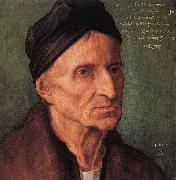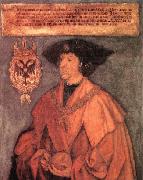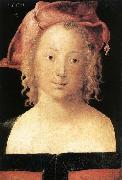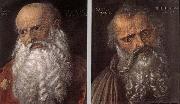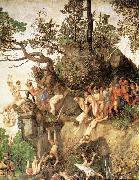
|
Artists
Index
|
||
|
Albrecht Durer
|
||
|
Portrait of Michael Wolgemut new21/Albrecht Durer-383922.jpg Pintura identificación:: 63747 |
1516 Oil and tempera on lindenwood, 29 x 27 cm Germanisches Nationalmuseum, Nuremberg After he had achieved great fame, D?rer depicted the master who had taught him to paint. On it he inscribed: `This portrait was done by Albrecht D?rer of his teacher, Michael Wolgemut, in 1516', to which he later added, `and he was 82 years old, and he lived until 1519, when he departed this life on St Andrew's Day morning before sunrise.' It is unclear from the inscription whether Wolgemut was 82 when he died or when the portrait had been painted three years earlier. Michael Wolgemut (1434/7-1519) had one of the largest artist's workshops in Germany. D?rer had served his apprenticeship there from 1486 until 1489 and Wolgemut must have been proud to have witnessed his former pupil's rapid success. In D?rer's portrait, everything is focused on the head, set against a neutral green background. The old man's features are not disguised, from his sunken eyes and gaunt cheeks to the loose skin around his neck. Wolgemut wears a fur-lined coat and a simple hat or scarf, perhaps the headgear he would have worn in his workshop to keep off the dust. His eyes are still alert and he has a thoughtful expression. D?rer does not depict a pitiable man, but marvels at his indomitable spirit.Artist:D?RER, Albrecht Title: Portrait of Michael Wolgemut Painted in 1501-1550 , German - - painting : portrait | |
| |
|
|
|
|
||
|
Emperor Maximilian I new21/Albrecht Durer-354425.jpg Pintura identificación:: 63748 |
1519 Tempera on canvas, 83 x 65 cm Germanisches Nationalmuseum, Nuremberg In 1518, D?rer went to the Diet of Augsburg following a delegation of dignitaries from Nuremberg. On that occasion, he did the portrait of Jakob Fugger (Staatsgalerie, Augsburg) and also one in a half-bust of the emperor, then fifty-nine. It is a pencil drawing carried out on 28 June (as indicated by the inscription on the same paper). Shortly thereafter, probably still during his sojourn in Augsburg, he did a second portrait, still in a half-bust, but this time painted on canvas: D?rer probably preferred canvas to panel because it simplified the execution, for the painting as well as for the transportation. This painting, now in the Germanisches Nationalmuseum in Nuremberg, did not have the inscription on parchment, which was added only after the emperor's death on 12 January 1519. The inscription is in German. It was transcribed, translated in Latin, in capital letters on the third panel portrait, now in Vienna.Artist:D?RER, Albrecht Title: Emperor Maximilian I Painted in 1501-1550 , German - - painting : portrait | |
| |
|
|
|
|
||
|
Portrait of a Young Girl new21/Albrecht Durer-475647.jpg Pintura identificación:: 63749 |
1507 Oil on panel tranferred from parchment, 30 x 20 cm Staatliche Museen, Berlin This small painting was in the collection of the Imhoff family of Nuremberg, and cited in their inventory from 1573-74 until 1628. In 1633, it was handed over, with the title Portrait of a Young Girl, with other works by D?rer, to Abraham Bloemart, an artist and merchant from Amsterdam. In 1899, the portrait reappears in London, and the firm P. and D. Colnaghi donated it to the Berlin art gallery. The delicate girl is portrayed with soft, curly blond hair, slightly dreamy her eyes, one somewhat lower than the other, a gentle, melancholic gaze; and well-defined, slightly parted lips. The red beret, worn sideways, with a little slit to the side, with a long red ruby and black pearl pendant, gives her a slightly cheeky air. The square green border of the red bodice sets off the upper part of her body. All these details put together have led to various interpretations. In addition to the fact that the "girl," when sold by the Imhoffs, was transformed into a "boy," Panofsky (1955) attributes an androgynous nature to her that could reveal the possible homosexual tendencies of the artist. A teasing letter of 1507 from the canonical Lorenz Behaim of Bamberg and the fact that the portrait does not seem to have been ordered would support this hypothesis. It has also been debated whether the painting was executed in Venice or after D?rer's return to Nuremberg. Considering the clothing to be typically German, there is no doubt as to its provenance.Artist:D?RER, Albrecht Title: Portrait of a Young Girl Painted in 1501-1550 , German - - painting : portrait | |
| |
|
|
|
|
||
|
The Apostles Philip and James new21/Albrecht Durer-254947.jpg Pintura identificación:: 63750 |
1516 Tempera on canvas, 45 x 38 and 46 x 37 cm Galleria degli Uffizi, Florence D?rer's monogram and the date are visible in the upper part of the two canvases, which are part of a series of twelve heads of apostles which the artist planned, though never completed. The two heads are constructed with an incisive and meticulous line, a reflection of D?rer's troubled search for moral austerity. We may recall that this was a particularly delicate time in German history, shortly before the emergence of Martin Luther and the Reformation. The two saints inspire a diffuse sense of solemn veneration, in the passionate, severe eyes, the embittered curve of the mouths, and the overabundant beards, depicted as heavy, noble masses of coiling hair.Artist:D?RER, Albrecht Title: The Apostles Philip and James Painted in 1501-1550 , German - - painting : religious | |
| |
|
|
|
|
||
|
The Martyrdom of the Ten Thousand new21/Albrecht Durer-739325.jpg Pintura identificación:: 63751 |
1508 Oil on canvas transferred from panel Kunsthistorisches Museum, Vienna The representation of the violence of the torturers and the various positions of their victims, on their knees and lying on the ground, demonstrates the wide knowledge D?rer had acquired about the human form and laws of perspective. A refined psychological sensibility and pictorial mastery characterize almost all the figures of this tragic scene: for example, the almost cinematographic sequence of the people who are made to fall from the cliff in the top left.Artist:D?RER, Albrecht Title: The Martyrdom of the Ten Thousand (detail) Painted in 1501-1550 , German - - painting : religious | |
| |
|
|
|
|
||
| Previo Artista | ||
|
Also Buy::. For Following Paintings / Artists / Products, Please Use Our Search Online: |





